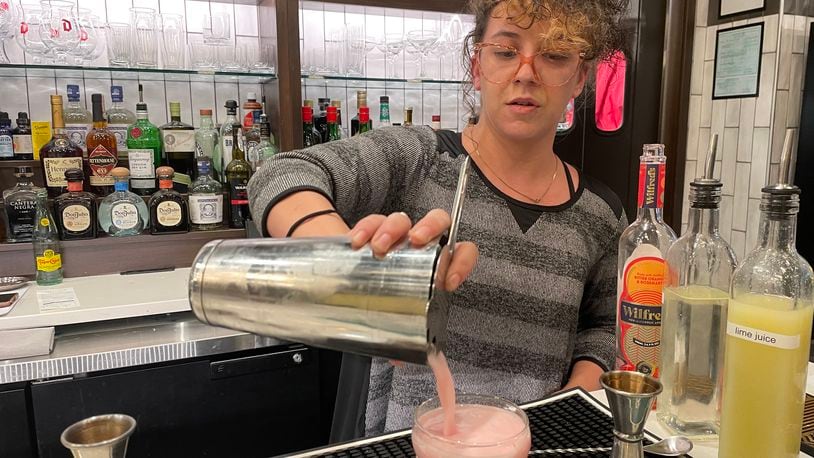Laura Rea, of Butler Twp., has been participating in Dry January for at least eight years. She said she first started because she had a few friends in the UK twho had success with it. As she continues each year she uses the time as a way to reevaluate her relationship with alcohol.
Credit: Submitted Photo
Credit: Submitted Photo
Jendaya Herbert of New Carlisle is participating for the first time this year. She said she has family members that are sober and she figured this would be a fun way to go on a sober journey, without having to fully commit to being sober.
Credit: Submitted Photo
Credit: Submitted Photo
Other reasons people participate in Dry January is because they want to be a part of the movement, have learned about the physical and mental health benefits of abstaining from alcohol and want to see if it will work for them or want to see if it will impact them socially, said Colleen Oakes, manager of the Montgomery County Prevention Coalition.
The movement started in 2013
“Dry January started in 2013 with 4,000 people,” according to Alcohol Change UK’s website. “Now in it’s 11th year it’s come a long way since then, with over 175,000 taking part in 2023.”
Alcohol Change UK is a charity working for a society that is free from the harm caused by alcohol, the website states.
“Alcohol is a part of many of our lives. We use it for celebration, for comfort, to socialize, to wind down, to cope. We treat it differently to other drugs; it’s legal, socially acceptable, even encouraged,” the website states. “We are not anti-alcohol; we are for alcohol change. We are for a future in which people drink as a conscious choice, not a default; where the issues which lead to alcohol problems — like poverty, mental health issues, homelessness — are addressed; where those of us who drink too much, and our loved ones, have access to high-quality support whenever we need it, without shame or stigma.”
Health benefits
Rea recalled the first year she participated in Dry January and said it was “surprisingly easy. The first thing I noticed, and I notice it every year, is I slept better.”
Other health benefits people have reported include better skin, weight loss and decreased blood pressure, Oakes noted.
“Alcohol abstention also tends to make people feel mentally sharper and can decrease feelings of anxiety,” Oakes said. “There is also a sense of achievement in participating in a challenge like Dry January. People are able to do some important self-reflection — is alcohol something I can go without for a week or a month? Was it tough for me to do? If so, there may be some underlying issues that need to be addressed in 2024.”
Tips to have a successful Dry January
Herbert and Rea are both participating in Dry January with their significant others. Doing it with others helps people stay accountable, Oakes said. They can also help support through successes and challenges. Here are a few other tips Oakes provided:
- Record things throughout the month to remember how you felt during this time. Did you lose some weight? Did you feel less anxious? Notice a difference in your complexion? You can also note the things that were difficult for you, like attending a concert or a happy hour event with no alcohol. All of these can help if you decide to continue a dry month or return to it.
- Be upfront and honest with others about what you are doing and why you are doing it. If someone offers a drink, you can politely refuse. If they ask why, just explain that you are trying out Dry January. Most people report that their friends and peers were much more understanding and supportive than they thought.
“I encourage people to give Dry January a try. You can do anything for 31 days,” Oakes said. “The people we’ve talked to who have tried this have reported that it was much easier than they thought, and the people around them were extremely supportive. If you give it a try and it’s harder than you anticipated, it may be time to reevaluate your relationship with alcohol.”
Where to go for non-alcoholic beverages
Credit: Natalie Jones
Credit: Natalie Jones
As Rhea and her fiancé try Dry January for the first time, she said the hardest part might be finding fun places to go that offer non-alcoholic beverages because they haven’t explored that avenue of drinking before. The couple recently completed the Dayton Ale Trail and hope January will be a reprieve after a whirlwind of a trail.
Below is a sampling of establishments in Dayton offering non-alcoholic options.
- Blind Bob’s, 430 E. Fifth St., 937-938-6405, www.blindbobs.com
- The Bottle Shop by Ghostlight, 1201 Wayne Ave. (located inside the coffee shop), 937-985-2633, www.ghostlightcoffee.com
- DK Effect, 1600 E. Third St., 937-416-2750, www.dkeffectbrewcade.com
Credit: Natalie Jones
Credit: Natalie Jones
- Gather by Ghostlight, 37 W. Fourth St., 937-985-2633, www.gatherdyt.com
- Lily’s Dayton, 329 E. Fifth St., 937-723-7637, www.lilysdayton.com
- Joui Wine, 117 E. Third St., 937-813-1186, www.jouiwine.com
- Jollity, 127 E. Third St., 937-938-9089, www.jollitydayton.com
- Salar Restaurant and Lounge, 400 E. Fifth St., 937-203-3999, www.salarrestaurant.com
- Sueño, 607 E. Third St., 937-453-0008, www.suenodyt.com
- Tender Mercy, 607 E. Third St. (lower level), 937-453-007, www.tendermercy.com
- Van Buren Room, 122 Van Buren St., 937-250-1837, www.vanburenroom.com
- Wheat Penny Oven & Bar, 515 Wayne Ave., 937-496-5268, www.wheatpennydayton.com
For individuals experiencing substance use or mental health disorders, the Montgomery County ADAMHS Board offers the Local Help Now web application, which includes a list of treatment and prevention resources. The ADAMHS Board also hosts a variety of free trainings for Montgomery County residents about substance use and mental health challenges.
Credit: Natalie Jones
Credit: Natalie Jones
About the Author
